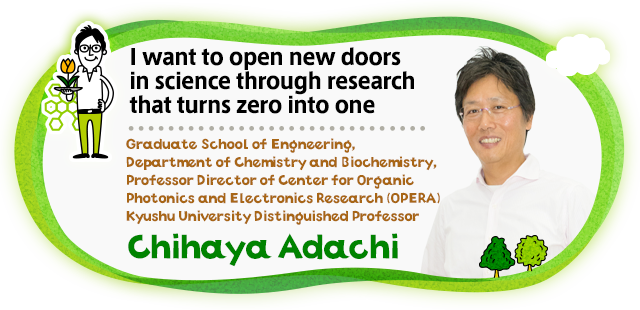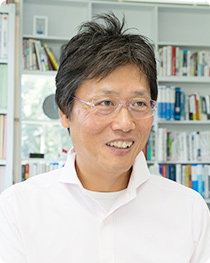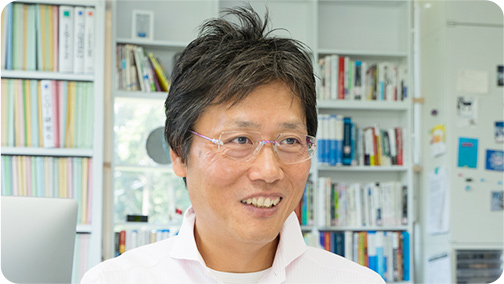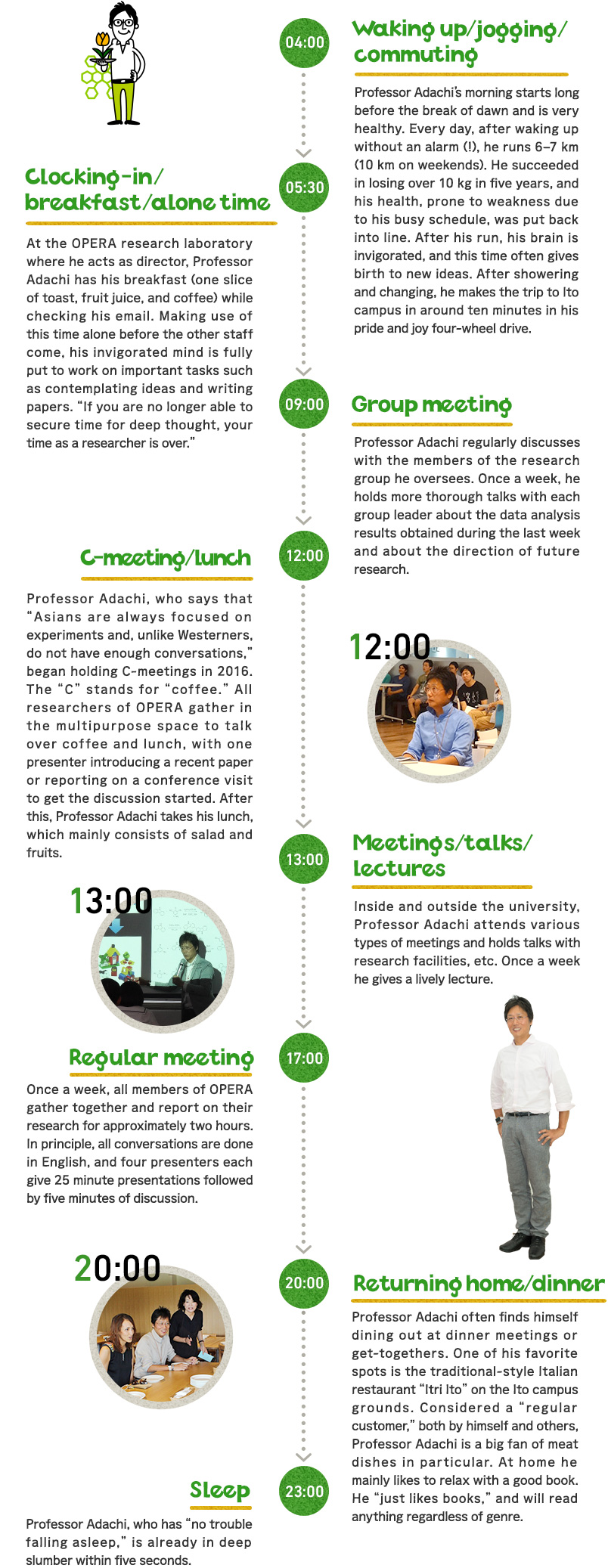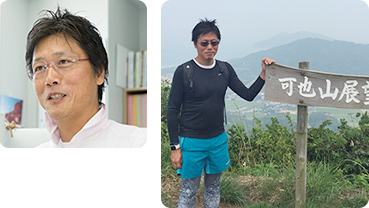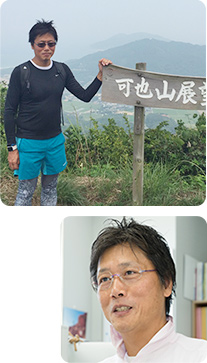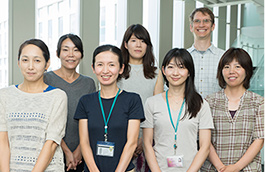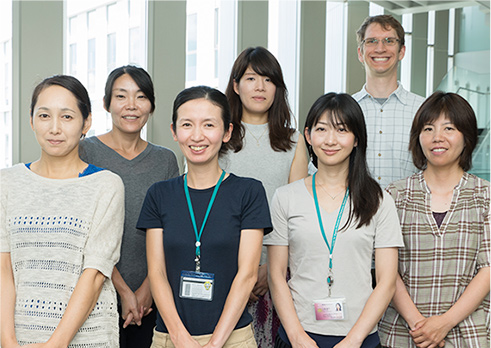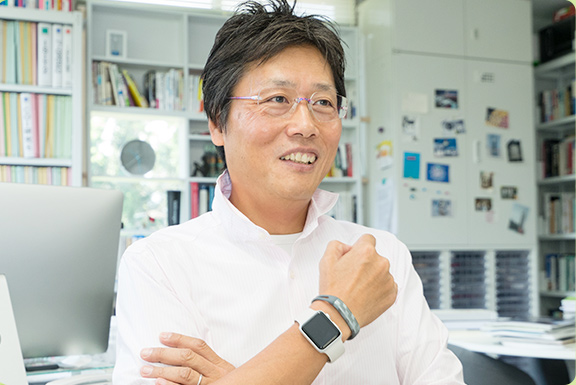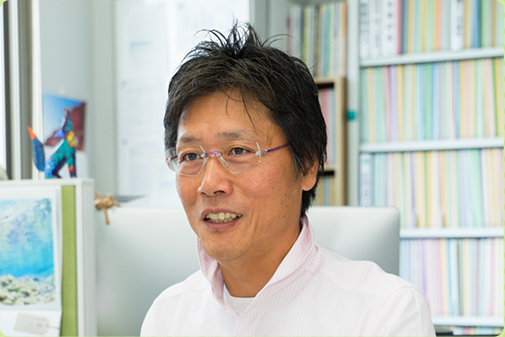 Professor Adachi, who is always striving to move forward with the motto, "no technology is impossible!"
Professor Adachi, who is always striving to move forward with the motto, "no technology is impossible!"
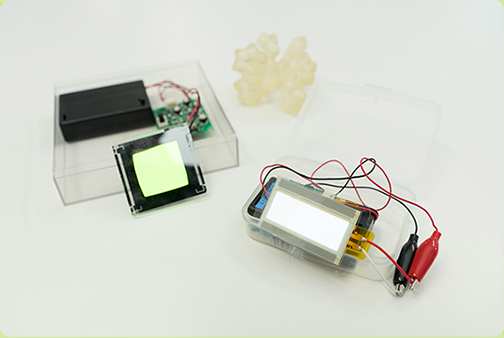 Sample organic EL devices, which emit light when electric current is passed through extremely thin organic films.
Sample organic EL devices, which emit light when electric current is passed through extremely thin organic films.
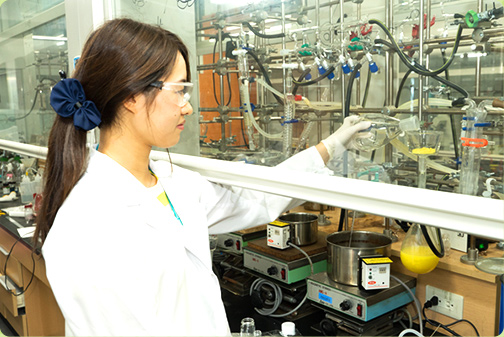 In the Adachi research laboratory, each student learns to perform all steps from molecular design and synthesis to device fabrication and characterization on his or her own. Through this process, new and unprecedented materials and devices are born.
In the Adachi research laboratory, each student learns to perform all steps from molecular design and synthesis to device fabrication and characterization on his or her own. Through this process, new and unprecedented materials and devices are born.
 Thus, the philosophy of Professor Adachi, who is always striving to move forward with the motto, "no technology is impossible!"
Thus, the philosophy of Professor Adachi, who is always striving to move forward with the motto, "no technology is impossible!"
My specialization is organic electronics. To put it simply, I do research for realizing the application of new organic materials in electronics by passing electricity through non-conductive organic insulators, as opposed to metals or inorganic semiconductors like silicon, that convert electricity to light with 100% efficiency. By using extremely thin organic films with thicknesses of only 100 nanometers, or one two-hundredth the thickness of a hair, we were able to succeed in the realization of third-generation organic electroluminescent (EL) materials (thermally activated delayed fluorescence (TADF) materials) in 2012 and published the results in the authoritative international science journal Nature. That accomplishment and its influence have been widely recognized, and in 2016 I received a prestigious Japan Research Front Award*. As the selection criteria are based on objective statistics, it was a great joy to receive, and I feel that it was a moment of pride for all the members of the lab that worked on the development. At present, as a technology advisor for Kyulux, Inc., a start-up company established in 2015 with the goal of implementing this new technology, we are aiming for commercialization of the first products using these materials in 2018.
 Sample organic EL devices, which emit light when electric current is passed through extremely thin organic films.
Sample organic EL devices, which emit light when electric current is passed through extremely thin organic films.
With the third-generation organic EL materials that we developed, new possibilities have opened in the research field of organic EL. By taking maximum advantage of their high flexibility and ability to form light-emitting surfaces, in the future we are sure to see an increase in the commercialization of things like wallpaper that lights up and lightweight wearable devices such as the Apple Watch. However, considering that the "fourth generation" will come along at some point, we must not stop here but must keep moving forward toward new, undiscovered territory. As history shows, only those that continue to evolve and adapt survive. The Center for Organic Photonics and Electronics Research (OPERA) is just the sort of place to make that happen. Because ideas are limited if we are a closed group of Japanese from specialized fields, the Center is always striving to secure new human resources and invigorate our members by, for example, inviting outstanding researchers representing a wide variety of fields from around the world. Through such ongoing self-improvement, we hope to continue producing valuable results that no one else has achieved.
 In the Adachi research laboratory, each student learns to perform all steps from molecular design and synthesis to device fabrication and characterization on his or her own. Through this process, new and unprecedented materials and devices are born.
In the Adachi research laboratory, each student learns to perform all steps from molecular design and synthesis to device fabrication and characterization on his or her own. Through this process, new and unprecedented materials and devices are born.
We have been selected to be a part of the Strategic Basic Research Programs in Exploratory Research for Advanced Technology (ERATO) run by the Japan Science and Technology Agency (JST), and we are working towards realizing organic semiconductor lasers as the next generation of organic EL devices. By raising the density of the electric current flowing through the organic material, I believe that we will eventually achieve laser emission. Just like with third-generation organic EL, a research that turns zero into one, we are presently aiming for the pinnacle and at the stage of trying many different paths to climb the mountain. It is a big challenge, but success will unmistakably lead to dramatic changes in devices including those for displays, telecommunications, measurements, analyses, and more. Going into the future, I hope to continue defying conventional wisdom by opening doors to new science that will remain in textbooks, and in turn, by cultivating industries that will support the Japan of the future.
* Research Front Awards
Research Front looks at the top 1% of the most frequently cited articles belonging to the 22 science and technology categories classified by Thomson Reuters, an international information services enterprise based in the U.S.A., and analyzes articles citing them alongside other later published articles. Based on this analysis, researchers whose work is strongly influential in a cutting-edge field and who are active and contributing on a worldwide scale are designated and recognized.


With organic materials, there are unlimited possibilities for molecular design, just like how one is able to build a house or car with Lego blocks if one is able to find the right design. New and unique functions can be discovered and then actually used and seen in devices, which is what makes this field so charming. However, no matter how cutting-edge the equipment and environment, research rarely goes according to expectations. Rather, breakthroughs are made through people continually discussing with and providing stimulation for each other. That new ideas are born more easily in this way is another interesting aspect of research. The moment when you are able to prove your hypothesis and when everything goes as expected is exhilarating! A sensation that cannot be put into words shoots through one's entire body. However, within an hour you are looking for that next mountain to climb (laughs).
The world of science is infinite, and there is no end to research. That is precisely what makes it interesting. What's more, in universities we are able to concentrate on a process that turns zero into one—that is, a process starting from nothing and ending with the first buds. That is where universities have their raison d'être and value.

![]()




